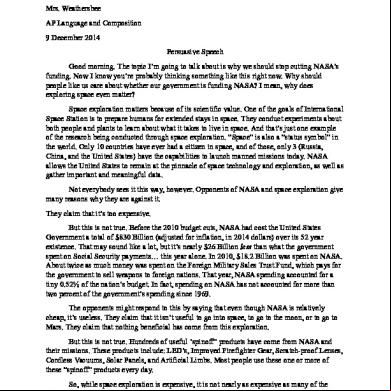Persuasive Speech 1y4937
This document was ed by and they confirmed that they have the permission to share it. If you are author or own the copyright of this book, please report to us by using this report form. Report 3l3c15
Overview 3z723u
& View Persuasive Speech as PDF for free.
More details 2i4a6q
- Words: 604
- Pages: 3
Eli Horner Mrs. Weathersbee AP Language and Composition 9 December 2014 Persuasive Speech Good morning. The topic I’m going to talk about is why we should stop cutting NASA’s funding. Now I know you’re probably thinking something like this right now. Why should people like us care about whether our government is funding NASA? I mean, why does exploring space even matter? Space exploration matters because of its scientific value. One of the goals of International Space Station is to prepare humans for extended stays in space. They conduct experiments about both people and plants to learn about what it takes to live in space. And that’s just one example of the research being conducted through space exploration. “Space” is also a “status symbol” in the world. Only 10 countries have ever had a citizen in space, and of those, only 3 (Russia, China, and the United States) have the capabilities to launch manned missions today. NASA allows the United States to remain at the pinnacle of space technology and exploration, as well as gather important and meaningful data. Not everybody sees it this way, however. Opponents of NASA and space exploration give many reasons why they are against it. They claim that it’s too expensive. But this is not true. Before the 2010 budget cuts, NASA had cost the United States Government a total of $830 Billion (adjusted for inflation, in 2014 dollars) over its 52 year existence. That may sound like a lot, but it’s nearly $26 Billion less than what the government spent on Social Security payments… this year alone. In 2010, $18.2 Billion was spent on NASA. About twice as much money was spent on the Foreign Military Sales Trust Fund, which pays for the government to sell weapons to foreign nations. That year, NASA spending ed for a tiny 0.52% of the nation’s budget. In fact, spending on NASA has not ed for more than two percent of the government’s spending since 1969. The opponents might respond to this by saying that even though NASA is relatively cheap, it’s useless. They claim that it isn’t useful to go into space, to go to the moon, or to go to Mars. They claim that nothing beneficial has come from this exploration. But this is not true. Hundreds of useful ‘spinoff” products have come from NASA and their missions. These products include: LED’s, Improved Firefighter Gear, Scratch-proof Lenses, Cordless Vacuums, Solar s, and Artificial Limbs. Most people use these one or more of these “spinoff” products every day. So, while space exploration is expensive, it is not nearly as expensive as many of the other expenses that the government has. It also provides us with many useful inventions and
innovations that people use all of the time. In conclusion, NASA is a worth-while investment for this country that, if funded, will continue to pay great dividends in the future.
References Budget of NASA. (2014, October 12). Retrieved December 4, 2014, from http://en.wikipedia.org/wiki/Budget_of_NASA This source provides data about the amount of money adjusted for inflation spent on NASA over the course of the organizations existence. Chantrill, C. (n.d.). Government spending in the US. Retrieved from http://www.usgovernmentspending.com/ This source provides data on the spending of the United States government by year and category. Garcia, L., & Johnson, A. (2014). What we pay for. Retrieved December 7, 2014. This source organizes publicly-available federal budget data into a format that is easier to visualize and understand. Jones, J. (2008). NASA technologies benefit our lives. Retrieved December 7, 2014, from http://spinoff.nasa.gov/Spinoff2008/tech_benefits.html This source provides a list of spin off technologies that were created from NASA research.
innovations that people use all of the time. In conclusion, NASA is a worth-while investment for this country that, if funded, will continue to pay great dividends in the future.
References Budget of NASA. (2014, October 12). Retrieved December 4, 2014, from http://en.wikipedia.org/wiki/Budget_of_NASA This source provides data about the amount of money adjusted for inflation spent on NASA over the course of the organizations existence. Chantrill, C. (n.d.). Government spending in the US. Retrieved from http://www.usgovernmentspending.com/ This source provides data on the spending of the United States government by year and category. Garcia, L., & Johnson, A. (2014). What we pay for. Retrieved December 7, 2014. This source organizes publicly-available federal budget data into a format that is easier to visualize and understand. Jones, J. (2008). NASA technologies benefit our lives. Retrieved December 7, 2014, from http://spinoff.nasa.gov/Spinoff2008/tech_benefits.html This source provides a list of spin off technologies that were created from NASA research.





